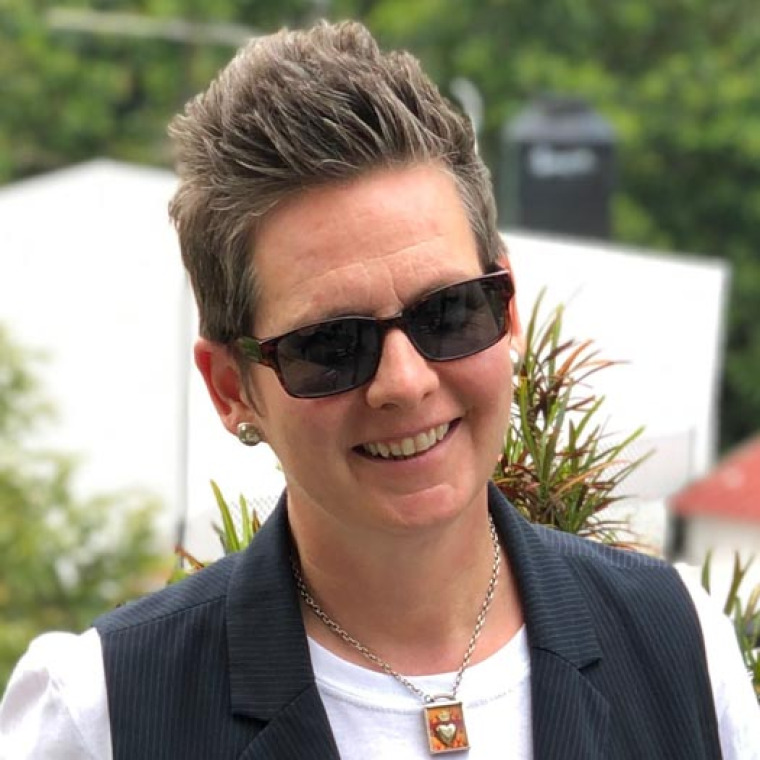Jamie A. Lee

Faculty Fellow 2019-2021
Jamie A. Lee works predominantly in archival studies and media studies. Her focus on what she calls dynamic and relational multiplicity aligns with her commitment to increasing the diverse voices, stories, bodies of knowledge, and knowledge-making practices in media and in the archives. Lee came to the university after two decades of working in media and as an award-winning social justice documentary filmmaker. Her professional and community-focused experiences shape her values and vision as a teacher, scholar, archivist, storyteller, and media-maker.
Lee founded the Arizona Queer Archives, AQA, Arizona’s first LGBTQ archives. She collects oral histories and, in keeping with the principles of social justice media that have become the foundation for all of her work, she trains community members on how to use digital video equipment to collect oral histories within their own home communities for the AQA. With Sandy Littletree, Ph.D., she has co-directed the Stories of Arizona’s Tribal Libraries oral history project that worked in collaboration with the Colorado River Indian Tribes, Ak-Chin Indian Community, Fort McDowell Yavapai Nation, and the San Carlos Apache Nation to facilitate the recording of local histories related to the creation of their tribal libraries.
Since 2015, she has been working with Tracey Osborne, Ph.D., as Co-PI on the Climate Alliance Mapping Project (CAMP), a story-mapping project across the Americas that brings together scientific data and digital stories produced by affected communities to educate the public, connect local communities with global climate justice networks, and inform policy decisions. Through this ongoing digital storytelling and oral history work in and with communities, Lee became more interested in how storytelling operates within communities. She recognized the barriers that can exist between communities and technologies that can sometimes impede communities from producing their own digital stories and documentation. Informed by conversations with local communities, Lee created the Digital Storytelling & Oral History Lab, DS|OH Lab, that she continues to develop through the School of Information as a transdisciplinary, collaborative, and community space to understand storytelling as a relational research method. Her ongoing research focuses on the power of storytelling in and for archives and the ways that archives, in turn, shape historical contexts.
Current work as the Haury Faculty Fellow
“The Haury Program Faculty Fellowship will allow me to connect my scholarship on oral history and storytelling to my social justice documentary filmmaking. I will return to my film project, started over ten years ago, to expand its scope from the Juárez, Chihuahua/El Paso, Texas/Anthony, New Mexico border region to the Arizona/Sonora border region. My collaborative documentary film/digital humanities project, Aguamiel: secrets of the agave (with co-director Adela C. Licona, Ph.D.), documents what everyday ‘experts’—especially Mexican and Mexican-origin households and women’s cooperatives—are doing to re-imagine and redress the practices that have entrenched inequalities and environmental injustices. With Haury's support, I will continue to draw on the principles of social justice media to teach hands-on media production while facilitating digital storytelling workshops. Community participants and I will co-conduct interviews and document stories of experiential and culturally-relevant knowledge to reveal what people are doing as they face climate change in their own communities. I am partnering with BorderLinks, a local place-based educational non-profit, to co-develop an intersectional approach to climate change and climate justice that considers global inequalities, human rights, migration, historical responsibility, and our borderlands context. I look forward to this opportunity to ensure that the complexity of the border region will be documented and made accessible to broad audiences through documentary film and digital media.”
